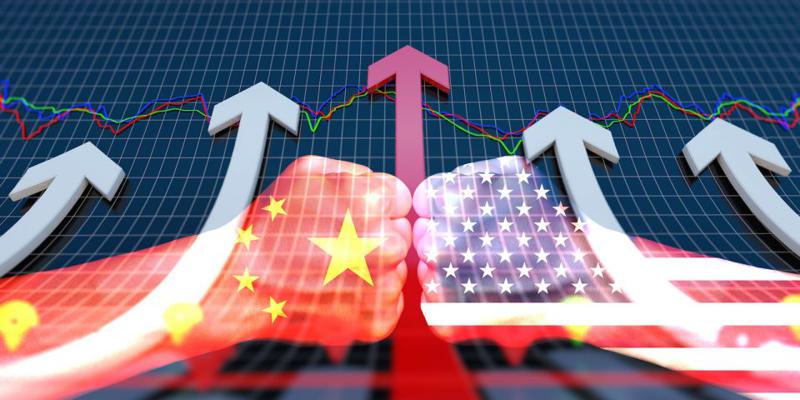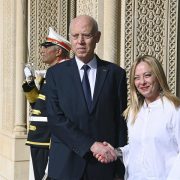Once again, after years of relative silence, Beijing’s rumor mill is in full swing. The central discussion revolves around the ongoing trade war with United States.
The official argument is that China is not scared. It has a large domestic market, and its technology is improving rapidly, so it can do with a decreasing dependency on exports. Besides, while tariffs undercut trade, Beijing has moved quickly to depreciate its currency in order to make up for higher import duties in the US. The net result perhaps will be that China could export even more.
Moreover, the Chinese read international newspapers and gather that America and the West are on the verge of decline, if not collapse. They see that US president Donald Trump is divisive: there is a vocal half of United States that is militantly against him, and the opposition abroad, in the once loyal European Union, is even tougher. NATO looks in shambles and the United States is angering everyone with its new trade policy. The South China Morning Post rightly comments that the US has too many enemies for its own good.
Therefore, people in Beijing surmise that there is not much to worry about. They can lock themselves up for a while and wait for the storm to pass. America will blink, China will make some concessions and things will go back to normal, i.e. with China firmly on the rise.
However, there are some in China who allegedly challenge this analysis. A clash with the US is anyway a very serious thing that can’t be underestimated. They blame China’s foreign affairs chief, Politburo Standing Committee member Wang Huning, for misunderstanding the gravity of the situation with America until a couple of months ago.
Allegedly, some of the retired leaders, led by immortal Jiang Zemin (92!), called for Wang’s removal in a stab plainly aimed at President Xi Jinping. That is, it seems that the foreign pressure has rekindled some internal bitter controversies, which had been smoldering under the ashes.
In fact, Wang Huning and Xi Jinping are not the only ones guilty of misreading American intentions. The mistake comes from long before, about twenty years ago, when China grossly misunderstood American intentions, and for about thirty years, Beijing has stopped paying due attention to foreign policy. Let’s start with the long stretch.
Follow the West, up to a point
Thirty years ago, in the summer of 1988, party secretary cum de facto prime minister Zhao Ziyang launched a comprehensive program of price liberalization. It was a shock therapy suggested by Chicago economic monetarists, who were then advising US president Ronald Reagan and British prime minister Margaret Thatcher. The idea was that China’s planned economy needed to go through a massive shock and after that market rules would push the economy onto the right path, that of healthy market freedom and development. This in turn would fulfil Chinese long held dream of catching up with the West and becoming something like America.
However, about a month into this trial, all shops in China were empty, prices had gone through the roof, there were shortages of even basic commodities like rice and soap, people were hoarding goods, and the Chinese leadership went into a frenzy. Old Soviet-style economists led by then Premier Li Peng, with the backing of party veteran Chen Yun, stepped in: they blocked Zhao’s reforms and reintroduced old planned economy mechanisms.
This was not simply an economic measure; this was also a foreign-policy decision. China decided to move slightly away from US advice, and warmed up to the USSR, which was then led by reformer Mikhail Gorbachev. At the time, Gorbachev himself was reforming his own political and economic system with his policy of glasnost (transparency) and perestroika (development). Therefore, in autumn 1988, the more cautious Chinese economic reforms – more in line with the USSR but not disregarding the USA, when both superpowers were improving relations and ties – could have been fully in line with China’s de facto alliance with the United States. That is, looking at this from the US, China was warming up to the Soviets as a kind of reward for the Soviets warming up to America.
However, a few months later, with the crackdown on pro-democracy demonstrations in Tiananmen Square, the fall of the Berlin Wall in the fall of 1989, and the collapse of the Soviet Union in 1992, this picture completely changed. Practical Chinese leaders thought that taking too much advice from the United States would eventually lead to the collapse of the country, and after 1992, rather than following the United States more closely, a portion of the Chinese leadership came to believe that one of the lessons to be learned from the fall of the Soviet Union was the need to maintain tight political and economic control, and be prudent with taking too much guidance from America and the West. The West should be followed but only up to a point – there should be no blind trust in foreign advice. This opened the door to taking foreign advice with increasing discretion.
At the same time, some former Tiananmen activists felt betrayed twice by America. First, they resented that the US had abandoned the students and de facto kept aloof when the crackdown took place. To them, the US could not be trusted in a time of dramatic change. Moreover, in the 1990s, when the Chinese computer industry was taking off and was often pirating US software and hardware, Washington vehemently protested against Chinese IPR theft, and Beijing was trying to shield and protect the former activists turned computer geeks. In other words: to these ex students the Chinese government looked more reliable than a foreign one, once matters of national interests were at stake.
But, all in all, Chinese leadership understood that its domestic policy was closely tied to its foreign policy and analysis of the external world. The internal and external elements could not be separated.
A farther past
This was after all also the lesson of the Communist Party, which came to power by tuning its external alliances to its domestic policies. In fact, after Mao Zedong opened to Nixon in 1971, America got a new ally that could offset the political defeat in Vietnam, and China got an even bigger reward. Under threat of an invasion by the Soviet Union, the United States dramatically improved Chinese defense capabilities, and American defense experts enhanced China’s strategies, tactics, and weapons. That is, America ensured Chinese survival in case of a clash with neighboring USSR, with whom it fought a short and limited but bitter war along its northern frontier.
Later, after Mao’s demise and with Deng Xiaoping’s rise to power, military collaboration between China and the US improved even further. China helped the US arm anti-Soviet mujahedeen fighting Moscow in Afghanistan, and most importantly, it fought Vietnam in 1978 after Hanoi had invaded Cambodia and toppled the local pro-Chinese regime, which Washington considered a hedge against pro-Soviet Vietnamese expansion in Indochina.
In return for this support, in the 1980s China was granted very favorable market conditions, with low export tariffs for the US, and a green light for technological transfers.[1] In other words, in the 1980s, Chinese leadership was very clear that its economic development was dependent on American support and goodwill, which had to be paired with Chinese entrepreneurship and hard work. In that case the fact that the state owned all the lands and resources made quite easy for foreign investors to deal with China. Investors had to talk directly to the official in charge who, if conditions were right, could provide land, utilities, tax breaks and even labor at the contracted cost. Nothing like that could happen in a capitalist country, like India for instance, where all these elements were different players.
By the early 1990s, the situation had changed, not only in China, but also in the United States and in the world. China was shocked by the USSR’s collapse, but was even more surprised by the first Gulf War in 1991, when American forces brutally crushed the more numerous Iraqi army in just a few days. The rise of intelligent warfare, targeting missiles with a very precise aim, was a huge accomplishment for the American army. For the Chinese, it was a signal of their weakness and backwardness.
But it was also a warning to the Chinese to improve their military capabilities in a very massive way. China understood that the American foreign policy umbrella was there to stay. America had not cut ties with China after the Tiananmen crackdown, and it rebuilt a dialogue on the eve of the Gulf War. In other words, Beijing understood that China was too important to America to dampen relations. The new policy of globalization, led by then president Bill Clinton, further confirmed the feeling that China was not to be isolated again by the US. Globalization was for the Chinese a delocalization of US production, and China was to become very important as a manufacturing base and as a potentially enormous market for US production. This was the basic groundwork for the community of interests between China and foreign countries, as later Zheng Bijian called it.[2]
American efforts to push its new doctrine of globalization and successful lobbying for China’s entry into the newly established World Trade Organization (WTO) created an infrastructure in which the US did not see China as an enemy, although China was beginning to think of itself as not totally America’s friend.
The long pro-Russian wave
In fact, the long wave of pro-Russian sentiment that surfaced in 1988 was growing still. An important element was the US intervention in the former Yugoslavia in the early 1990s. Many Chinese didn’t really understand it, and didn’t believe The US stepped in to help the European countries that were unwilling to fight and die for Yugoslavians. Some Chinese thought the aim was to weaken the stillborn European Union, which had just decided to create a united currency that could be a counterbalance to the US dollar. In all of this, the Chinese grew warmer to the little guys, the Serbians. They felt for them, as the Serbians were trying to hold onto the unity of Yugoslavia against all the other “splittist forces”. They felt that United States was somehow also threatening China. Tibet and Xinjiang could become independent from China, Taiwan could declare independence, and Hong Kong might never be returned to the motherland – this was the atmosphere that led the Chinese to side with the Serbs.
In this environment, the Americans “accidentally” bombed the Chinese embassy in Belgrade in 1999. Allegedly, it was in retaliation for the Chinese behavior in the preceding days. The Chinese embassy had allegedly helped the Serbian forces to shoot down a new-generation Stealth bomber, and parts of the downed bomber were recovered by Yugoslavian forces and possibly given also to the Chinese army.
The Belgrade episode embittered the old China-US relations. Some Chinese felt extremely threatened by the USA, believing that Washington was thinking of doing to China what it had done to the USSR and to Yugoslavia. Meanwhile, some forces in America thought it was high time to deal directly with China, as it was becoming the main enemy, and it could become very threatening.
In this atmosphere, George W. Bush was elected president and in the year 2000 shut down the new Sunshine Policy that had been started by South Korea in order to open up to the North. China was backing South Korea and considered the US aboutface a blow against its own pro-American forces. In the meantime, China had been backing a six-party dialogue to improve ties with North Korea, a plan hatched by the US.
However, both in America and in China things were uncertain, and not everybody thought that China would become an enemy. In fact, the majority view was that China would either collapse or “become like us” if it pursued a path of economic liberalization and integration into the WTO. In other words, there was no rush to confront China.
On April 1, 2001, again bilateral relations had a shock when a US EP-3 surveillance plane crash-landed onto the Chinese island of Hainan after a mid-air incident with a Chinese fighter that was tailing it. After the incident, tensions quickly escalated and the Chinese leadership was apparently panicking over this new situation.
They saw the collapse of all the complex architecture that elderly leaders of Deng Xiaoping’s generation had built. They felt under siege. Internally, China was extremely weak. Just two years earlier, the Falun Gong cult had staged a massive protest against the top leadership, possibly with the help of security forces, and its influence was still very massive in the country and in the party. Protests in Tibet were on the rise, and Beijing’s hold on Hong Kong was still very uncertain.
Miracles for the Chinese, and their prices
Then, the 9/11 massacre changed all American and global priorities, and for China it was a miracle. In a matter of days, America completely changed its focus and moved from China to the Middle East and Central Asia.
China was quick to cooperate fully with America on Afghanistan and the new American focus away from China.
Moreover, in the following years, the failures of the wars in Iraq and Afghanistan; the failures of the Jasmine revolutions in Libya, Egypt, and Syria; and the squandering of hundreds of billions in those hopeless conflicts all led to and helped create the 2008 financial crisis. The crisis also gave the Chinese the idea that the American system, failing in wars and failing in finance, was in decline.
But most importantly, over a period of twenty or thirty years, China didn’t feel a lot of external pressure. It was very much unlike the time before the 1970s, when China felt threatened by Russia. Before that, China’s survival was endangered by the Japanese invasion, and before that, by colonialist powers. Since the late 1980s, China grew accustomed to an atmosphere of great peace. This peace was actually guaranteed by the goodwill of the United States and the West – yet they apparently didn’t demand much in return, unlike previously with the Russians, Japanese, and colonialists.
Therefore, more and more in the years following the Tiananmen crackdown, China grew to believe that its relationship with the United States was one that may not be very good, but would not be very bad either. It had to be managed: there was not great room for improvement, but also not great room for falloff. China also took its trade surplus with major technological partners for granted.
Chinese development was somehow unstoppable, Beijing came to believe, also because American and Western interest were closely tied to Chinese growth, which had become very important for the Western growth and for global growth in general.
In other words, in the past thirty years, China basically gave up on thinking in realistic and innovative terms about the international environment. China didn’t realize that the global environment was not neutral: it was not an open prairie where Chinese raiders could wander, but rather it was an already occupied territory where Chinese businessmen were allowed in only as long as they provided welfare to themselves and others. But their path would be stopped and hindered if they were to misbehave or try to gain more than their fair share. What misbehavior may mean was according to the main player of the international field, i.e. the United States.
What happened in the past ten to fifteen years was that China simply got stuck in an internal constant power tangle starting roughly with the 2002 Party Congress. After that, it was not clear who was in charge: PLA Chairman Jiang Zemin, Party Secretary Hu Jintao, some of the retired leaders, or the new Politburo members.
In the years of great confusion leading to the 2012 congress that crowned Xi Jinping as “top dog,” it was very vague how decisions were made in China and who was in charge of what. In this situation, foreign policies were very short term, not reflecting long-term changes and not thinking of the domestic implications of those changes.
It was in this time that President Xi Jinping inherited a confused mixed bag, where nobody was in charge of anything and there was no clear assessment of the international environment.
This situation presently has not much changed. China is still thinking of its crisis with the US in internal terms, according to ideas that are twenty or thirty years old. The leadership failed to see the trade war coming, and they failed to recognize their own behavior was and is being read as tantamount to a cold war.[3] They also have a possibly confused perception of their strengths and weaknesses.
In a sense, 9/11 gave China an unexpected lull of eighteen years, but the lull blinded the Chinese leadership to the real international situation. The Chinese didn’t use the lull to better understand the world – they somehow squandered it by concentrating only on themselves.
Dovetail of Internal and International affairs
This was compounded by the fact that internal changes took a dramatic turn. After 1989, the leadership had a pact with the entrepreneurs: don’t get into politics and get rich instead. Therefore, they got rich by being close to power, thus corrupting the power. But if you get rich through corrupt politics, this decreases business efficiency and destroys politics, political career that can be bought with money, and politics can blackmail business, which have no sense of long term security, a basic element for long term commitment and investment.
Moreover, if entrepreneurs can’t do business in the old way, how can they do it? Is their money safe? Can it be seized by the power turning a policy on its head? The political crisis around the fall of ex-Chongqing party chief of Bo Xilai, where money bought politics on a grand scale, and vice versa, showed the depth of the fault lines in the system. With his anti-corruption campaign, Xi focused internally and was oblivious to the atmosphere abroad. He concentrated power, but then power must be redistributed – yet how?
At this point, the US and many other countries became fed up with China, and recent events show that the US can become a real enemy – and therefore it ought to become a real friend.
For all of this, foreign affairs must return to the center of Chinese thinking before they go too far and things get out of control.
In all of this Xi, Wang Huning, and their colleagues are not innocent, but they are not the main culprits either. It was a collective euphoria that made them all to forget that even miracles have their prices. And this not according to Western tradition, but the Chinese Buddhist tradition.
Moreover, by concentrating internally China in these decades has lost track of another major international shift. Populism is becoming dominant of politics in the West, and this puzzles and shudders Chinese politicians, but its long wave started in the 1980s, according to Italian political analyst and “godfather” of the new Five Star Movement Vincenzo Scotti.[4] Then, Mr. Scotti believes, monetarists recipes freed market and economic energies in an unprecedented way, boosting growth and planting the seeds of following globalization.
However, it gave the idea that market mechanisms could automatically solve social issues thus replacing the mediating capability of the state or of social bodies like associations or trade unions. The role of the state and social groups started shrinking and all kinds of social conflicts were cast more in the hands of bilateral deals. That is: politics as it had shaped for about 200 years, since the French Revolution, with the intervention of the state and politics in internal social and economic conflicts, started waning. Populists, with their emphasis on absolute, un-compromisable rights,[5] came to the fore to withstand and resist cold market forces, also led by the stony dynamics of mathematics and accumulation of profit. This squeezes the room for politics, which used to be the space for mediation between pulls of different interests, and transforms the political arena in a shouting match between different emotions difficult to reconcile with one another.
On one hand the trappings of the Chinese communist party, still molded in the dynamics of the 19th and 20th century, saved China from heartless monetarism and over hot populism, but is China missing out on something important here? Or is China, harking back in the past her advantage? De facto if its Party thinking is moving away from political thinking in other parts of the world, mutual contacts and understanding will become more difficult.
There is no clear answer so far, but the question is back to the summer of 1988.
[1] See http://www.settimananews.it/politica/war-or-peace-around-china/ and http://www.settimananews.it/italia-europa-mondo/three-waves-of-recent-us-china-history-leading-to-present-clash/ and http://www.settimananews.it/italia-europa-mondo/utilitarianism-democracy-and-moderating-role-for-the-holy-see/
[2] See for instance https://www.brookings.edu/wp-content/uploads/2012/04/20050616bijianlunch.pdf
[3] https://www.nytimes.com/aponline/2018/07/21/us/ap-us-united-states-china.html
[4] I owe the following passage to long conversation with Mr Scotti.
[5] I owe to Procurator General of Rome Mr Giovanni Salvi this analysis.







“Ancora una volta una bella lezione di storia del nostro Francesco cui vanno i nostri complimenti. Triste riscontrare che neanche sullo sfondo si avverte una presenza significativa della nostra Europa, tirata in ballo soltanto per le sue difficoltà interne e per il suo non-ruolo nei conflitti della ex Jugoslavia che fu forse la pagina più nera se non l’avvisaglia per il de profundis per l’Unione. Buona fortuna a chi pensa che la nostra italietta possa galleggiare da sola in questi scenari. Speriamo non debba invocare il salvataggio delle ONG!”